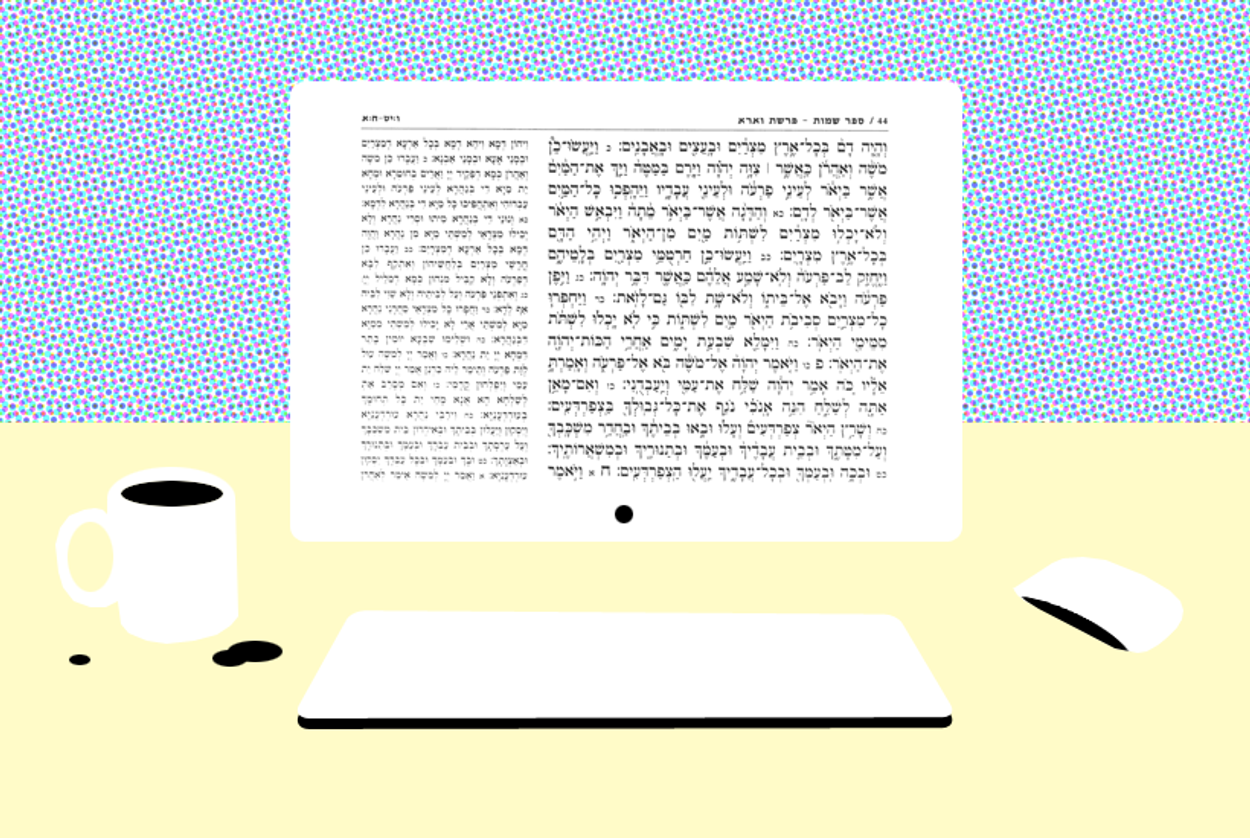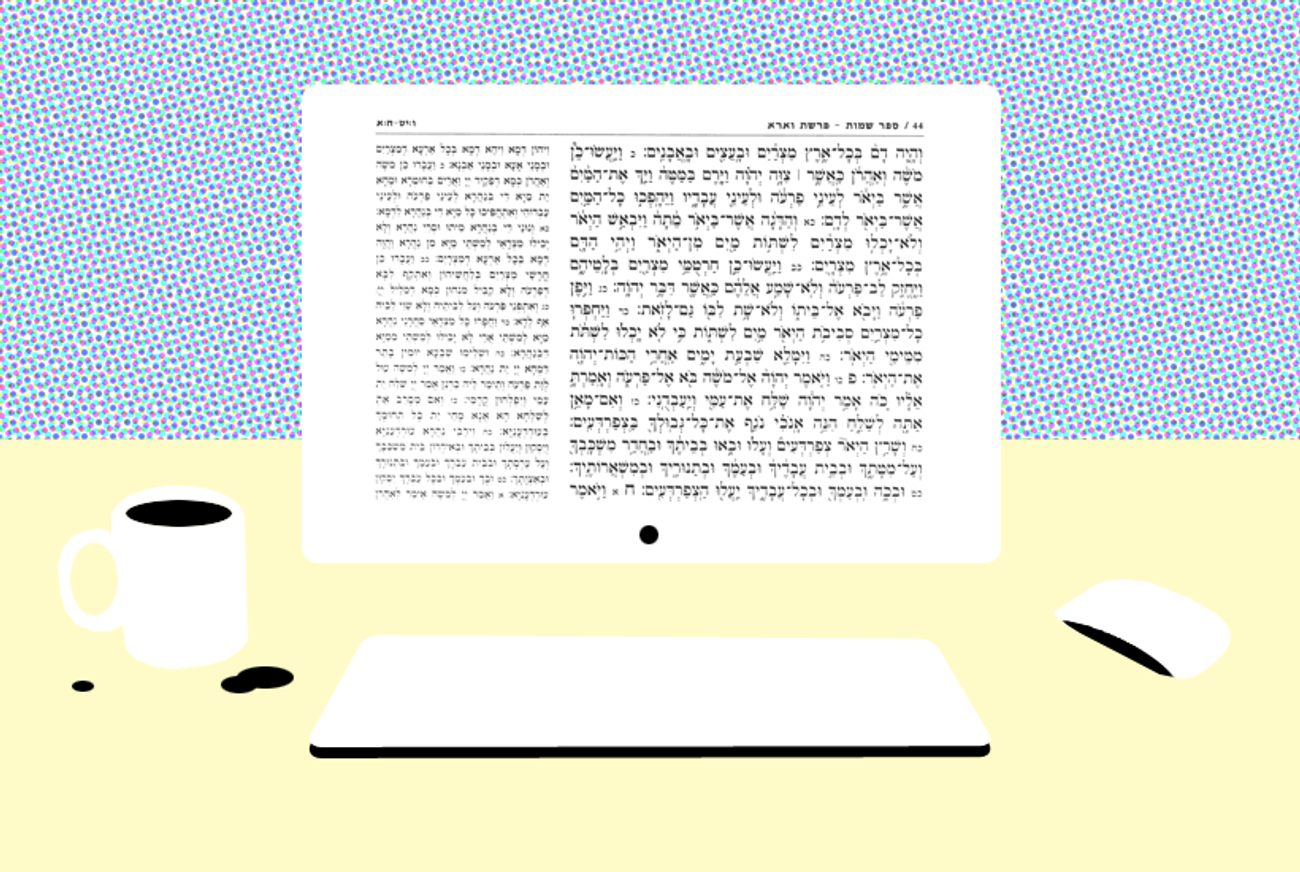Left and Right, Secular and Religious, Brought Together by Bible Study
Israelis from across the political and religious spectrum join a national conversation about the Tanakh, on the website 929




As Israel’s election season kicks into high gear, it’s pretty much impossible to find any of the country’s leaders on the same page politically. But on a new Israeli website called 929, you’ll find everyone from settler leader Naftali Bennett to far-left Meretz party head Zehava Gal-On on the same homepage. Their subject: the Bible.
Launched over Hanukkah, 929 is a $12 million Israeli initiative to turn the Tanakh into a national conversation. Drawing its name from the 929 chapters of the Hebrew Bible, the project aims to get hundreds of thousands of Israelis from all walks of life to complete the corpus over three-and-a-half years by covering five chapters a week. (The endeavor is akin to the Daf Yomi cycle, where participants finish the entire Talmud over seven-and-a-half years, but pitched to a broader and more diverse audience.) The hub of the enterprise is its state-of-the-art website, where readers can find commentary from a wide array of contributors, from celebrated secular authors like Etgar Keret and A.B. Yehoshua, to spiritual leaders like ultra-Orthodox former Chief Rabbi Yisrael Meir Lau and progressive trailblazer Rabbi Tamar Elad-Appelbaum.
In addition, the site features explanatory videos and cultural artifacts—from comics to music clips—related to the weekly chapters and a detailed timeline allowing participants to track their progress; it can even read the Bible aloud to the visually impaired or those on the go. Finally, every piece of content is designed for easy sharing on a variety of social networks. (After a little over two weeks in operation, 929 has over 13,000 Facebook followers.)
Israel already has a national Bible-learning initiative of sorts—the annual International Bible Contest, or Chidon ha-Tanakh, which quizzes youngsters on Torah trivia on live television every Independence Day. But while that event caters to an elite group of exceptional students, 929 is targeted at the Israeli mainstream. By bringing together secular and religious Jews around the same text, the hope is to foster a positive sense of Jewish unity and spark a national dialogue.
“It’s sad to say, but today, our enemies around us make us one nation,” said Rabbi Benny Lau, one of the project’s organizers (and nephew of the former chief rabbi). “They put us together in little rooms when bombs come from Gaza. And this is a tragedy of Israeli society: that when you want to think about unity, you need to have an enemy. What the project says is the opposite: We need to find the shared language of one nation.” The purpose of 929, in other words, is not to convert people from one point of view to another, but to put their perspectives in conversation with each other. “Everyone keeps his own beliefs—each with his own shita [view], with his own derekh [path]—but we have the same language,” he said. “We read the same book.”
929 is the brainchild of Lau, a South Jerusalem Orthodox synagogue rabbi who directs the Human Rights and Judaism in Action project at the Israel Democracy Institute, and Israel’s Deputy Education Minister Avi Vortzman. Together, they helped raise the funds needed to bankroll the initiative—split approximately 50/50 between the government and outside sources—and assembled the eight-person team of editors, web designers, and graphic artists who made it a reality. Lau himself met personally with over 300 Israeli journalists, actors, scholars, politicians, and artists about the project and brought many of them on board as contributors. Though 929 has a substantial budget, a large number of them nonetheless volunteered their time.
Finally, after years of preparation, the project launched over Hanukkah with a ceremony at the residence of Israeli President Reuven Rivlin that was attended by rabbis, politicians, artists, and academics. “We are beginning today a collective journey,” Rivlin said at the event, “chapter after chapter, book after book, with paths filled with magnificence, beauty, and humanity.” Billboards publicizing the project were placed across the country, and study groups were organized at local Jewish centers, schools, and even army bases. Today, 929 counts over 100 such groups. The organizers hope to reach 1,000 by summer.
The site has already published hundreds of pieces of modern biblical commentary. On any given day, in addition to more traditional scholarship from rabbis and academics, one might find a leftist politician explaining how the Tower of Babel reminds society that it must never lose sight of the individual while pursuing its collective goals; or the IDF’s chief of staff expounding on why we are all our brothers’ keepers; or a new rendering of the Garden of Eden tale by a popular poet; or even an animated cartoon imagining the struggles of the animals who had to leave their families behind when they boarded Noah’s ark. The goal, said Lau, is for each person to be able to choose “who they learn with, how they learn, and who they learn from.”
Of course, given that the Bible is the most contested book in human history, it should come as no surprise that within a week of its debut, 929 became embroiled in multiple controversies. On the Israeli religious right, some commentators immediately seized upon what they considered heretical or disrespectful content on the site. Given the project’s heterodox literary staff and target audience, the inclusion of less-traditionalist approaches to the Bible was a feature of the initiative, not a bug, but for some it made participation problematic. “Project 929: Dream or Nightmare?” read a representative headline. One rabbi even went so far as to say that “visiting the website of 929 is forbidden by the Torah.” In response, Vortzman, the deputy education minister, announced that a third party would be setting up a “kosher” version of 929 for those who did not want to be exposed to the questionable content.
Meanwhile, others on the Israeli left were outraged when it appeared that one of the site’s secular contributors, noted biblical scholar and educator Ari Elon, had been booted from 929 over his edgy postings. This turned out to be a misunderstanding—Elon is still signed on, though one of his pieces was delayed—but the passionate outcry reflected the suspicions held by many secular Israelis about whether a Bible-learning initiative co-run by an Orthodox rabbi could possibly be truly open to nonbelievers and non-traditionalists.
Despite these initial bumps in the road, however, Lau is very happy with 929’s roll-out. “We can hear loud voices from both sides, the liberal side and the religious side, saying very strong words against the project,” he acknowledged. “But the majority—secular and religious, left and right, young and old, all kinds of people—are part of it.” By way of illustration, he pointed to the site’s traffic: half a million visitors in two weeks, 150,000 of whom marked down that they had read the required biblical chapters. “I think the numbers say something for us,” he said.
So far, his enthusiasm seems to be justified—and to be shared by others from outside the religious camp. Etgar Keret, a celebrated Israeli writer who authored a piece on the beginning of Genesis that ran on the site’s opening day, told me that he felt 929 was particularly important at this deeply divisive juncture in Israel’s social and political life. “There is a tendency in hard times to kind of simplify reality,” he said, “to define good guys and bad guys and break this very diverse and complex society into tribes and camps, usually with some kind of regressive subtext against any kind of otherness.”
A project like 929, which works to bridge the secular-religious divide, cuts against this destructive impulse and reminds Jews that rabbis like Lau and secularists like Keret might not be so different after all. “The fact that he has a yarmulke doesn’t mean that he cannot be a liberal or fight for equality in Israel,” Keret said, “and the fact that I don’t have one doesn’t mean that I should be afraid to give my readings to a verse in the Bible.”
***
Like this article? Sign up for our Daily Digest to get Tablet Magazine’s new content in your inbox each morning.
Yair Rosenberg is a senior writer at Tablet. Subscribe to his newsletter, and follow him on Twitter and Facebook.
Yair Rosenberg is a senior writer at Tablet. Subscribe to his newsletter, listen to his music, and follow him on Twitter and Facebook.